You may be surprised to hear that not all geese fly south for the winter. Some stay right where they are.
Different goose breeds react to cold differently, and when temperatures outside get low, not every goose in town is ready to fly away.
Geese can certainly get too cold, especially in freezing temperatures. Certain types of geese can withstand very cold temperatures better than others.
The Pilgrim goose, for instance, can do well in freezing temperatures with no shelter.
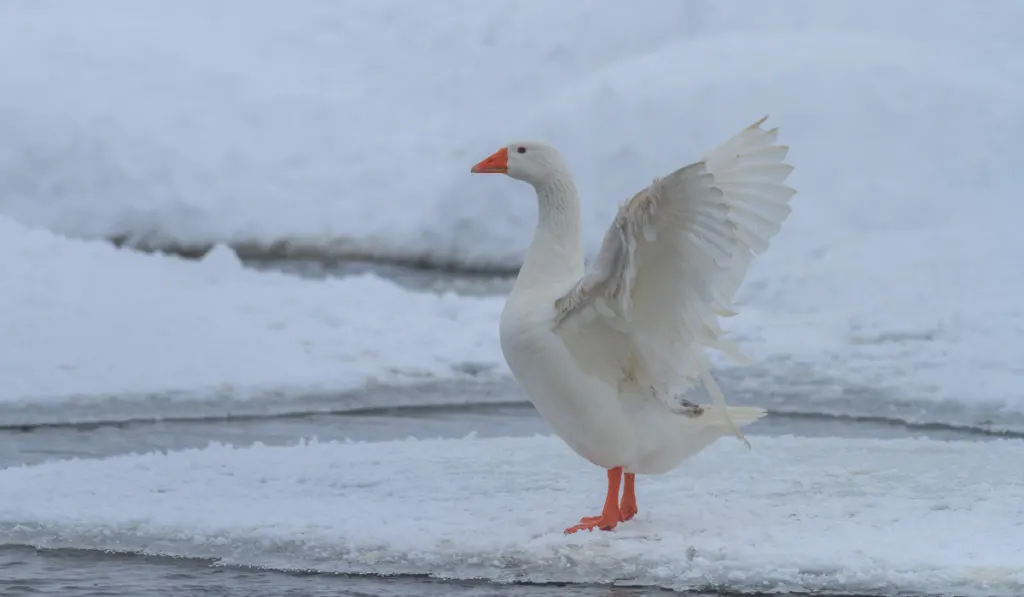
As a general rule, anytime it’s freezing outside, your geese are going to feel cold. Just how cold is the main issue.
To keep your geese healthy and safe, there are things you can do with their pen and where you place their food to keep them warmer when things get chilly.
You’ve probably seen geese flying overhead in that beautiful, graceful “V” formation as they head to warmer climates for the winter. The long migration of birds before and during winter is an evolutionary wonder.
But what about your geese?
If you own geese or are thinking about raising some geese, then you may worry about what will happen during the winter.
Will it get too cold for them and, if so, what should you do?
Table of Contents
Can Geese Freeze To Death?
Yes, geese can freeze to death.
This happens in extreme cases where geese are left outside exposed to extreme cold temperatures for prolonged periods.
Even their thick down coats and laying down on their feet aren’t enough to regulate their body temperature.
Likewise, malnourishment can lead to geese freezing to death. Without proper access to food and water, geese aren’t able to build the necessary fats and proteins in their bodies to keep them warm.
Eating a lot of food before and during the winter months helps them get through times with freezing temperatures.
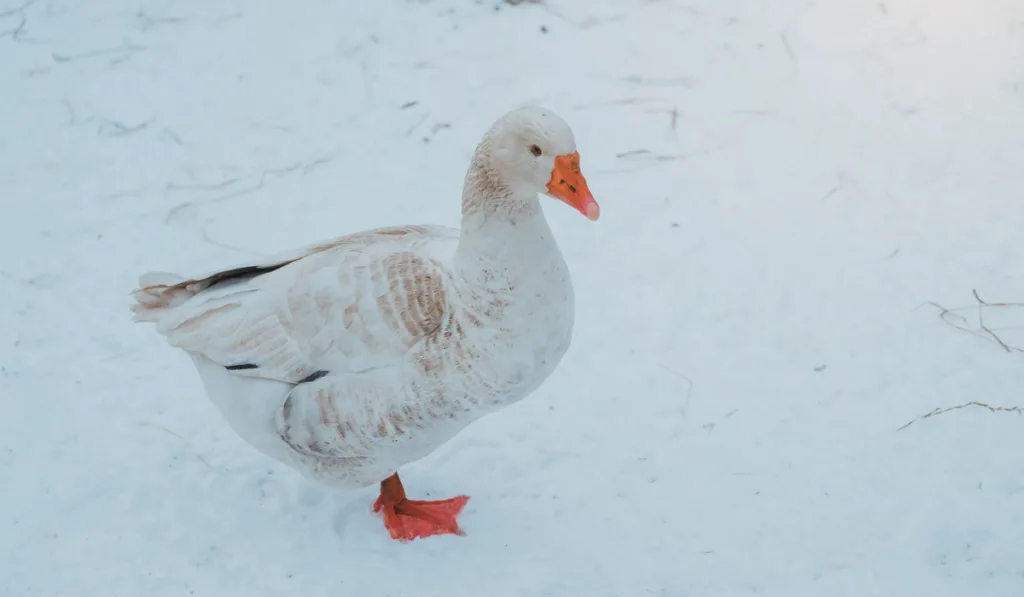
Can Geese Sleep Outside in the Cold?
The short answer is, yes, geese sleep outside in the cold all of the time.
Whether it’s something they should do for days and weeks, though, depends on how cold things get. Don’t just assume that because your geese are sleeping outside that it’s something they want to do.
If your pen is too small, for example, some of the weaker or smaller geese in the flock may have gotten pushed outside into the cold.
There may not be enough room for the geese to all lay down with enough room to spread their feathers out over their feet to keep them warm, so some go outside to try to get more space.
How to Tell If Your Geese Are Too Cold
If you’re worried about your geese, you can always give them a quick checkup.
If you’ve owned geese and their behavior changes drastically when the cold comes, then it could be cause for concern.
If you feel like your geese are constantly shifting position trying to get warm, it could indicate that they are too cold.
One thing to be on the watch for is frostbite. Birds can get frostbite if their feet and legs get too cold.
If you see swelling and redness on your geese’s feet, or if it looks irritated or discolored, then they could be getting too cold.
Frostbite needs to be dealt with immediately and often with professional help from your vet to keep your geese from having serious adverse reactions.
Frostbite, when not treated correctly, can be fatal.
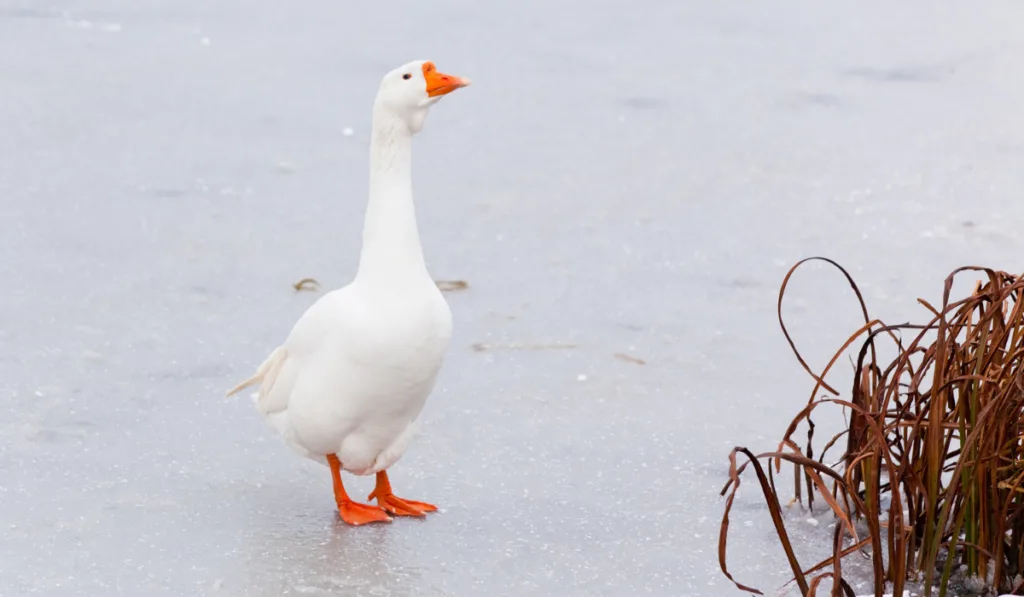
Should You Change Diet When It Is Cold Out?
Most of the time, geese owners simply need to make sure there is a constant supply of food and water available during wintertime.
Remember, your geese aren’t going to be able to eat grass and other things in a pond that’s been frozen over. Fields will be dry or have snow on them.
So, it’s not so much a question of changing diet, it’s making sure that they have all of the food that they need to stay warm when normal food options are limited.
If it’s freezing outside, keep checking on their water bowls to ensure they don’t freeze over so your geese can’t get a drink when they are thirsty.
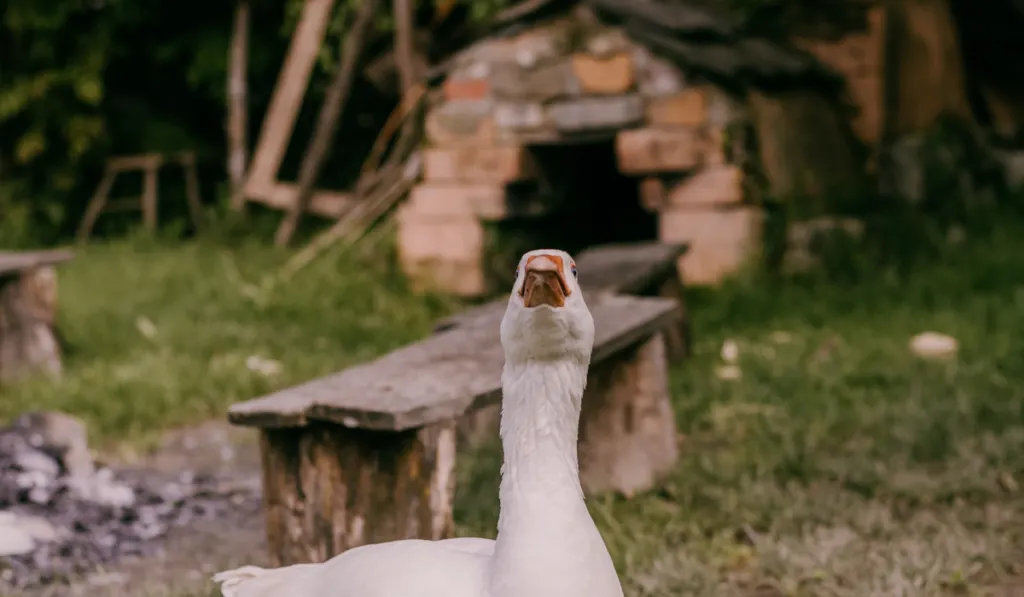
What Type of Shelter/Bedding Should You Provide for Geese During Cold Weather?
If you own geese, or you want to care for geese that visit your property every year, you should have a shelter out for them to use whether it’s winter or summertime.
When it’s cold, one of the biggest factors is wind chill. Wind can make things miserable for anyone, including geese. Build the shelter to limit wind as much as possible.
Make sure it’s got a roof with proper ventilation. Don’t put the water inside of the shelter because it can spill and make the floor wet and colder for when the geese lay down.
Keep the floor warm with hay or wood shavings.
This will help keep their feet warm and prevent frostbite. They’ll be better able to regulate their temperatures because covering their feet will be easier.
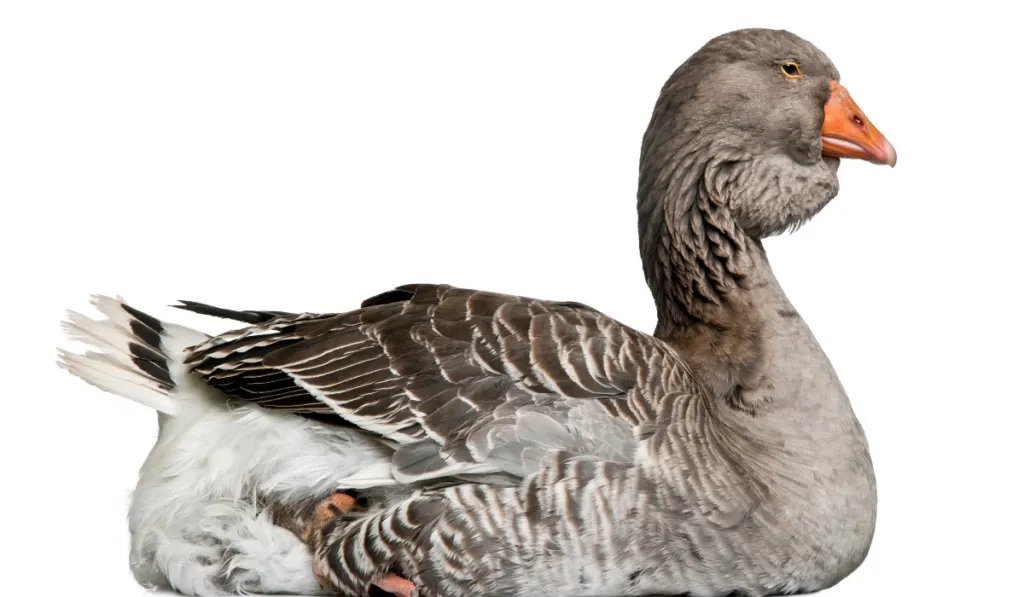
List of 3 Breeds of Domestic Geese That Do Well in Cold Weather
We said at the beginning that not all geese respond to very cold weather equally.
If you’re thinking about buying some geese, here are some breeds that will stand up to colder weather better.
- Embden – These geese are known for their pure white coat and lovely feathers that help them withstand very cold temperatures.
Their full coats help them cover their beaks and feet when things get chilly.
They usually grow to about 20lbs.
- Toulouse – Toulouse geese have large bodies and red/orange beaks and feet.
They grow very quickly, making them good winter birds.
They’ll reach around 25 pounds fully-grown, so make sure you have an enclosure big enough to accommodate large birds.
- Pilgrim – This type of geese don’t normally need shelter even in sub-zero temperatures.
It’s an ideal bird for people who live in very cold climates.
A male pilgrim is usually white with blue eyes while the females are grey with hazel eyes. They’re known to be friendly to humans and can make great pets.
